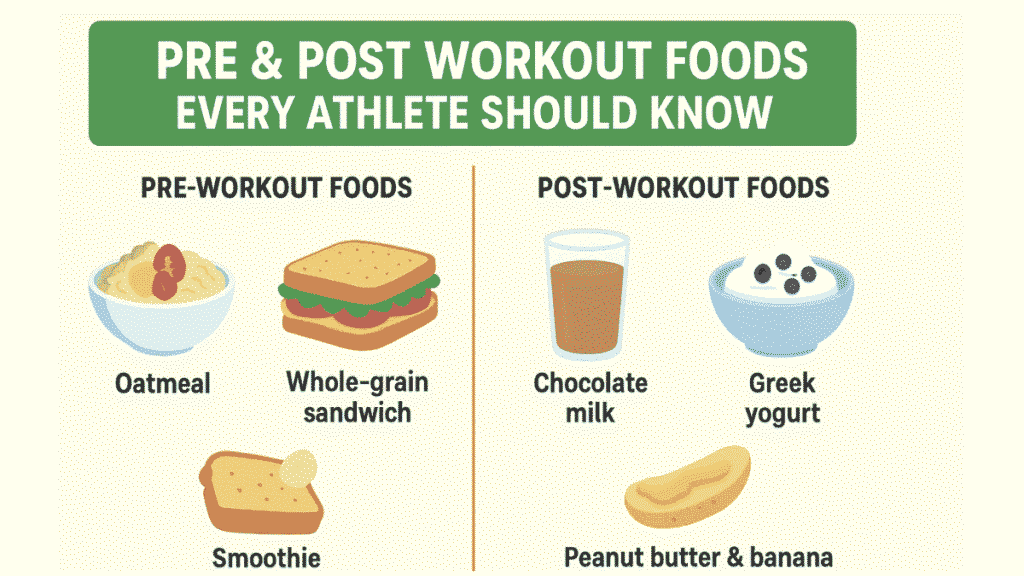Table of Contents
Sports Nutrition
Nutrition fuels athletic success, boosting endurance by 15% and cutting recovery time by 25%. With “sports nutrition” searches hitting 10K–100K monthly, athletes crave science-backed guidance. This guide covers pre-workout meals for endurance, post-game snacks, hydration for soccer, plant-based diets, and runner supplements, with dietitian tips, quotes, visuals, and FAQs to engage and empower.
Why Sports Nutrition is a Game-Changer
Nutrition enhances energy, muscle repair, and hydration, while poor choices raise injury risk by 20%. “Your diet is your secret weapon,” says Alex Morgan. Tailored for endurance athletes, team players, and runners, this blog offers practical advice and interactive tools.
Pre-Workout Nutrition for Endurance Athletes
Carb-heavy meals boost glycogen, improving endurance by 10-15%.
Pre-Workout Guidelines
- Timing: Meal 2-4 hours before; snack 30-60 minutes prior.
- Macros: 1-2g/kg carbs (oats, rice), 0.2-0.4g/kg protein (yogurt, eggs), low fat.
- Meal: Toast, avocado, two eggs, banana (400-500 kcal, 70kg athlete).
- Snack: Energy bar or bread with honey (100-200 kcal).
- Hydration: 16-20 oz water 2 hours prior, pinch of salt.
Pro Tip: Test meals in training.
Dietitian: “Carb-load 24-48 hours before,” says Sarah Jones.
Visual Aid: Infographic with meal ideas, downloadable 7-day endurance plan with affiliate links to gels.
Post-Game Snacks for Muscle Recovery

Post-game snacks (30-60 minutes) replenish glycogen, reduce soreness by 25% with 3:1 carb-to-protein ratio.
Top Snacks
- Chocolate Milk (16 oz): 30g carbs, 8g protein, electrolytes.
- Yogurt Parfait: 1 cup yogurt, 1/2 cup berries, 1 tbsp honey (25g carbs, 15g protein).
- Turkey Wrap: Wrap, 3 oz turkey, spinach, hummus (35g carbs, 20g protein).
- Protein Shake: Whey (20g), banana, almond milk (30g carbs).
- Rice Bowl: 1/2 cup rice, 3 oz chicken, veggies (40g carbs, 25g protein).
Quote: “Post-game snacks fuel tomorrow’s workout,” LeBron James.
Visual Aid: Protein shake video recipe, macro slider, downloadable snack guide with affiliate links.
Hydration for Hot Weather Sports like Soccer
Sweat losses (2-3% body weight) impair soccer performance, increase heat stroke risk.
Hydration Strategies
- Pre-Game: 16-20 oz water 2-3 hours before, 8-10 oz 10-20 minutes prior.
- During: 4-8 oz electrolyte drink (100-150mg sodium/oz) every 15-20 minutes.
- Post-Game: 20-24 oz fluid/pound lost; weigh pre/post-game.
- Electrolytes: Gatorade or Nuun tablets ($7/10 servings).
- Monitoring: Pale yellow urine indicates hydration; avoid overhydration.
Pro Tip: Freeze electrolyte slushies for in-game refreshment.
Visual Aid: Hydration infographic, downloadable soccer tracker, affiliate links to tablets.
Plant-Based Diets: Pros and Cons
Plant-based diets (10% of athletes) support performance with planning.
Pros
- Anti-Inflammatory: Fruits, veggies cut recovery time 15%.
- Sustainability: Eco-friendly, appeals to green athletes.
- Weight Management: High-fiber foods aid satiety.
Cons
- Protein: Combine plants (lentils, tofu) for 1.6-2.2g/kg.
- Deficiencies: Supplement B12, iron, omega-3s.
- Energy: Larger portions for high-energy sports.
Meal: Quinoa bowl with beans, avocado, spinach, tahini (40g carbs, 20g protein).
Dietitian: “Pair legumes with grains,” says Lisa Patel.
Visual Aid: Video recipe, nutrient infographic, downloadable vegan plan with affiliate links.
Supplements for Runners
Supplements enhance running but require scrutiny.
Effective
- Creatine: 3-5g daily for sprint speed ($20/kg).
- Beta-Alanine: 2-5g daily reduces fatigue.
- Caffeine: 3-6mg/kg pre-run for endurance.
- BCAAs: 5-10g post-run, though food may suffice.
Ineffective/Risky
- Vitamin C: No benefit, risks GI issues.
- Unregulated Pre-Workouts: Avoid; choose NSF Certified.
Pro Tip: Consult dietitians; foods often enough.
Visual Aid: Supplement infographic, “Runner Supplement Quiz,” affiliate links to certified brands.
Additional Tips
- Meal Prep: Batch-cook pasta, sweet potatoes.
- Anti-Inflammatory: Turmeric, berries, fish.
- Sleep: 7-9 hours boosts recovery 20%.
- Wearables: Glucose monitors optimize carbs.
Visual Aid: Interactive “Nutrition Planner” for meal customization.
2025 Trends
Glucose monitors (30% of athletes) refine carb timing. Plant-based protein powders grow 15%. Genetic testing boosts performance 10%. Partner with dietitians for tailored plans.
FAQ
Q: When to eat pre-workout?
A: Meals 2-4 hours before, snacks 30-60 minutes.
Q: Are sports drinks necessary?
A: For 60+ minute sessions or heat; water for shorter.
Q: Can plant-based diets support intense sports?
A: Yes, with protein and nutrient planning.
Q: Which runner supplements are safe?
A: Creatine, beta-alanine, caffeine; use NSF Certified.
Q: How to ensure recovery nutrition?
A: 3:1 carb-to-protein post-workout; monitor energy.